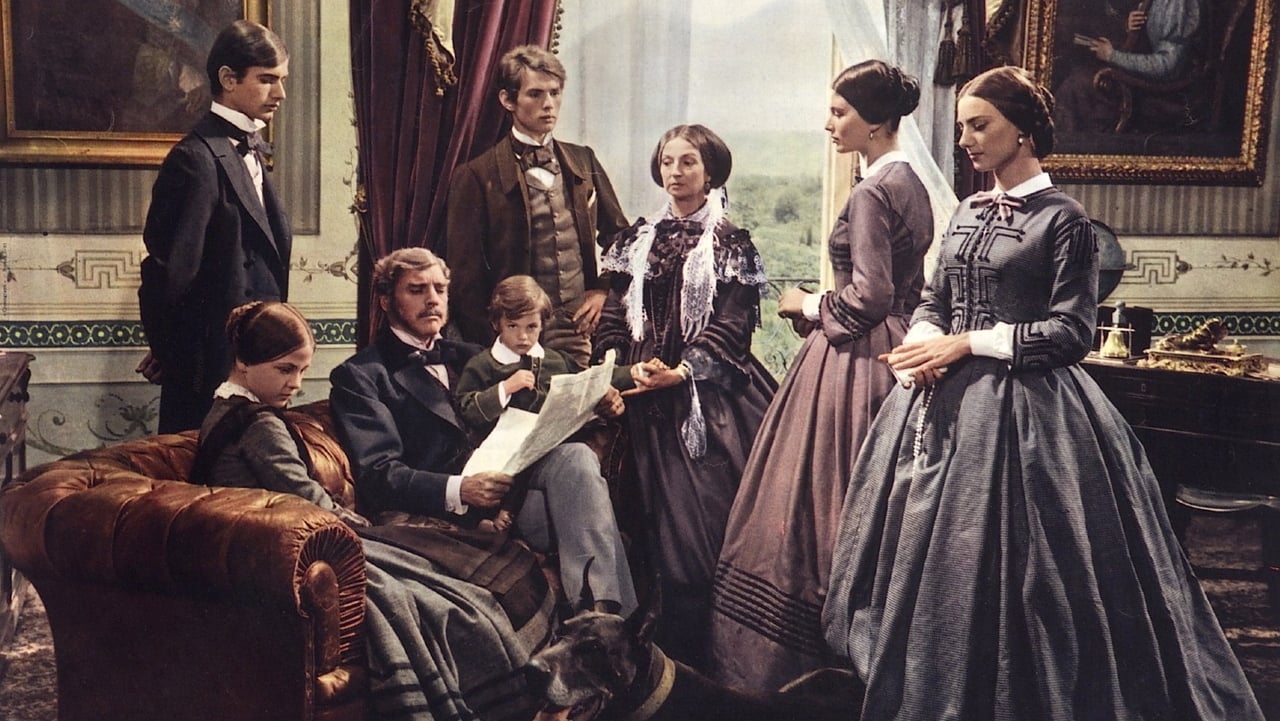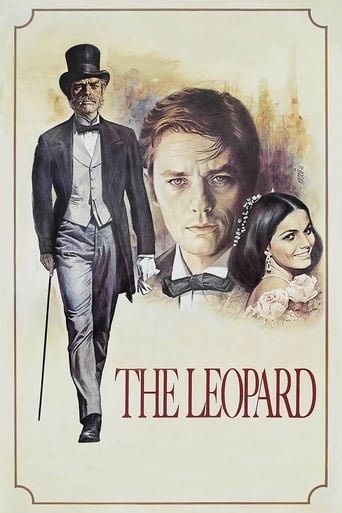

Intense, gripping, stylish and poignant
... View Morea film so unique, intoxicating and bizarre that it not only demands another viewing, but is also forgivable as a satirical comedy where the jokes eventually take the back seat.
... View MoreJust intense enough to provide a much-needed diversion, just lightweight enough to make you forget about it soon after it’s over. It’s not exactly “good,” per se, but it does what it sets out to do in terms of putting us on edge, which makes it … successful?
... View MoreThere is definitely an excellent idea hidden in the background of the film. Unfortunately, it's difficult to find it.
... View MoreFilm Review: "Il gattopardo" (1963)Fighting through competition as "Harakiri" directed by Masaki Kobayashi (1916-1996) and "To Kill A Mocking Bird" directed by Robert Mulligan (1925-2008) at Cannes Film Festival 1963 in its 16th edition, the ultra-lavish production value-indulging "Il gattopardo" directed by exceptional Italian director in visual and emotional transcendence Luchino Visconti (1906-1976) marks his masterpiece on international cinema with Hollywood leading actor Burt Lancaster (1913-1994) as Don Fabrizio Salina, the main character fighting insulting change in aristocratic societies with proletarian revolutionaries as the character of Tancredi Falconeri and Mario Girotti, portrayed by Alain Delon and Terence Hill respectively, when the eternal-feminine-sharing actress Claudia Cardinale as character of Angelica Sedara, at age 27, tribute to Guiseppe di Tomasi di Lampedua's novel from 1958 gives director Visconti the oppportunity to shine by finding balance in ultimate cinemascope visuals and sound to score by legendary composer Nino Rota (1911-1979) galvanizes a perfect picture on the fading existence of any generation, who stays for too long inmoveable in power of the way of life for the entire world to breathtaking quotes by the leading man, performed by match-making Lancaster: "It has to change everything in order to let everything stay as it is," before walking off into dark allies in night exteriors of mingling aristocrats with the organized proletariat."The Leopard" strikes further high notes with Academy-Award-nominated Costume Design by Piero Tosi, who favors Luchino Visconti's directorial vision, when this motion picture for the ages finds cinematic peaks in a 40-Minutes-ball scene in opera-splendid reception, where the inevitable change in 1860s Sicily, Italy becomes unstoppable with a smiling and whipping eye of life-exposing tragic proportions that any spectator take the time to witness this 180-Minutes-Film winning then without a doubt the "Palme d'Or" in its first international festival exhibition that becomes impeccable to deny by any audience that a human's life'S structures of security fade, where every individual on the planet strives from, getting here jeopardized over a single night of extravaganza. Copyright 2018 Cinemajsty Entertainments LLC
... View MoreI have only ever seen the Italian version of IL GATTOPARDO, with English or Portuguese subtitles, never the English version. Knowing Burt Lancaster's rich voice and seeing his lips move to some Italian actor dubbing him (the same applying to Alain Delon) costs my rating a star. Apart from that, it is a visually lush, superbly photographed, acted, and choreographed work directed by the great Luchino Visconti. It boasts perhaps the longest and most famous ballroom sequence in the history of the cinema, some well choreographed street battles, and it does a convincing period reconstruction job.Delon and Cardinale are breathtakingly beautiful, but under the surface they are driven by greed and other designs that reflect the cracks in the outward grandeur, splendor and beauty of the aristocracy in Sicily just before its demise. The leopard of the title, Prince Salina (Lancaster), is "straddled over two worlds and cannot leave either" - ultimately, he cannot change his spots, and must accept fate with what nobility, grace and dignity he can muster. And he does.Lancaster's role is generally regarded as one of his career's best, possibly supplanted only by his far smaller, and more cynical, part in "Atlantic City" and - a personal choice - his role in "Trapeze". Only a great visionary like Visconti could have sensed in the American symbol, mostly used as gunfighter in Westerns or a pirate in swashbucklers, Lancaster, the potential to play a Sicilian aristocrat. It is to Visconti's, and Lancaster's, credit that the latter imbues his performance with a perception, a sense of belonging, that perhaps few expected at the time, and even now leaves me wondering at the marvel and mimetic depth of human talent.Visconti's careful, sensitive and well-informed direction ultimately unites this rather long work, giving it a magnificence that even the best Hollywood-produced epics found hard to convey.It is a masterpiece one should see at least once in this life.
... View MoreA great subtle performance by all the main actors. This is where the heart of the novel comes through. Not through the director, but the actors. They have all picked up on the heart of the novel which is only revealed at its very end when Concetta is shown to be the hidden heroine. At the end of the novel we see Concetta in her old age, Tancredi's true love. How could the director have missed this? Perhaps he didn't want to see it as it doesn't fit into the neat 3 act Hollywood movie mold.Burt Lancaster is brilliant. But again here we have an actor giving so much more meaning to the movie than the plot is able to sustain. The ending of the novel is a shock and, of course, a disappointment but it exposes such a poignant moving and truthful loss that it really cannot be omitted.
... View MoreTo make a long story (187 minutes) short, Burt Lancaster is the leopard of the title, a Sicilian aristocrat of 1860, who watches the world change around him. There was a revolution in Sicily in 1860, too, with the rebels led by Garibaldi trying to unite Italy at the expense of the local nobility like Lancaster. He's disturbed by it all. And why shouldn't he be? For God's sake, they want to substitute the Italian tricolor flag we're familiar with today -- green, white, and red -- for Lancaster's family flag -- white with a golden lily. That's HIS flag, man, and he doesn't want to see it replaced with some rag representing the hoi polloi. And on top of that, he's middle-aged and seems to be growing more obsolescent by the day.Visconti wanted an all-Italian cast and evidently made it clear to Lancaster that he didn't fit the role. An argument ensued, after which the two got along much better, or seemed to. This was an epic movie and a lot of money was at stake.It must be said that Lancaster is figure instead of ground. He stands out if only because of his bushy hair and impressive mutton chop whiskers. But it must also be said that it sounds queer to hear Italian coming from Burt Lancaster's New York bred speech organs, especially when it's someone else's voice. He really doesn't have that much to say. He's taciturn, gruff, commanding, aloof.Yet he has one memorable scene. Everyone in this movie is concerned with appearances. They're always stopping in front of a mirror and patting their faces with a handkerchief, or smoothing out their mustache or something, ladies and gents alike. Towards the end, Lancaster stops in front of a mirror and stares at his own face for a long time. His features are expressionless. He seems to be looking into another temporal sphere -- the past or the future -- and his eyes water as the tiny rivulet of a tear becomes barely perceptible on his rough cheek.There's some humor too. Not much. All of these tiny Sicilian villages seem to have a raggedy band ready to play as the prince's entourage enters the town, and all the bands, maybe a dozen men all together, seem to feature not one but three tubas. Now, a tuba is a preposterous instrument to begin with, and to have three of them flatulating and burping along behind a pompous march is funny in itself, a perfect score for a silent Charlie Chaplin comedy.Then there's a scene in which a cheerfully corrupt mayor is reading out the fake results of an election. (Lancaster kept his vote open and everybody's vote was counted the same.) The wind keeps blowing out the candles and the band begins to play, on and off, and he turns red with exasperation while trying to keep up a proud front.Visconti makes good use of the wide screen. Each frame looks like a colorful painting. But it's long, and the themes are mostly understated. You have to pay attention. It could have profitably been chopped by twenty minutes or so.
... View More